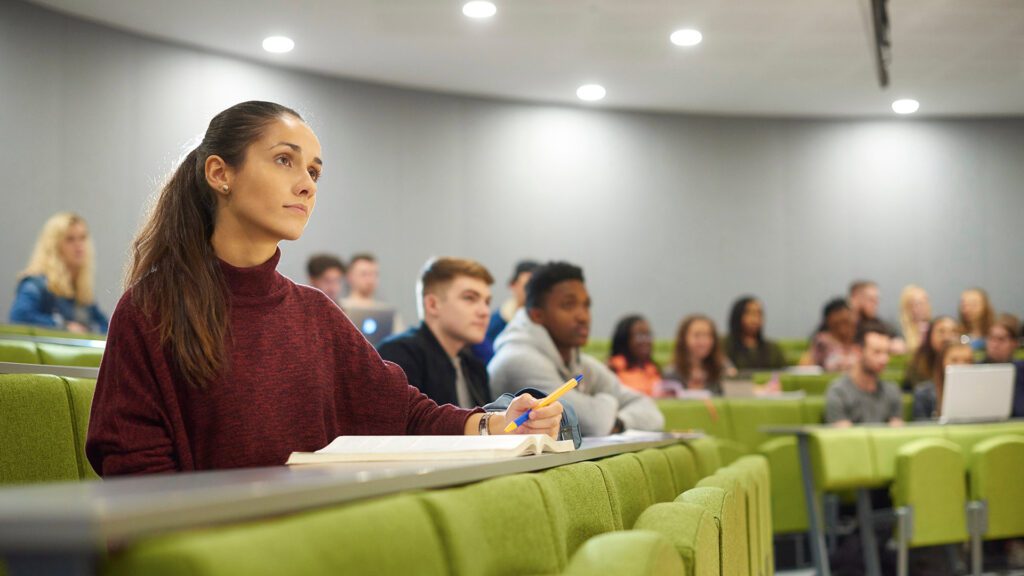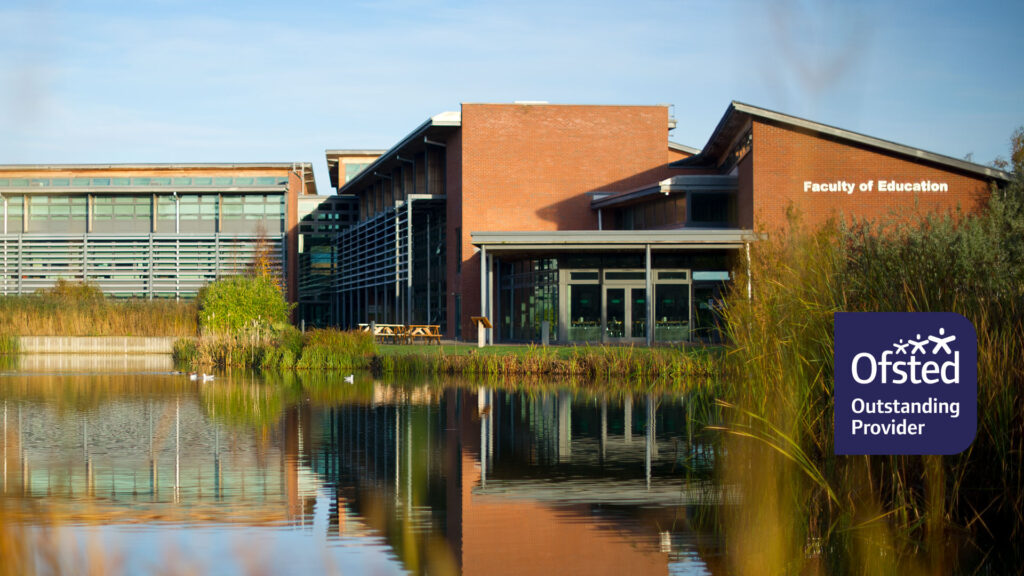Education Studies and Philosophy BA (Hons)
UCAS code: VX53
Focus on how both education studies and philosophy are utilised in the real world and explore the ideas of some of the most famous thinkers ever to have lived.
Subject to validation.
Overview
| Course length: | 3 years full-time |
|---|---|
| Start dates: | September 2025 |
| Location: | Edge Hill University |
| Example offers: | BCC-BBC (A Level) or DMM (BTEC) View full entry criteria |
| Subject(s): | Education and TeachingReligion and Philosophy |
| Faculty: | Education |
| Department: | Secondary and Further Education |

Discover the overlap between education and philosophy. Delve into questions relating to why we have a national education system in the first place. Why it has evolved the way it has and why we learn what we learn in the way we learn it.
Explore how we can say that we know the things we know such as: what is knowledge and how do we acquire and use it? Explore two of the most fundamental questions in any society: how should we organise and live our lives? And how should we prepare the next generation to take over from us?
If you are interested in the things that society chooses to be on the national curriculum. Why we have national examinations, who benefits from them and why are they the way they are then this education studies and philosophy course could be for you. You will also have the opportunity to apply and expand your learning with a work placement opportunity.
Course features
-
Sandwich year option available
-
Studying abroad option available
-
Work placement opportunity
-
International students can apply
What you'll study
In Year 1 of your degree you’ll study foundations of both education studies and philosophy. Key thinkers, texts, and ideas will be covered, as well as the core disciplines of education – history, philosophy, psychology and sociology of education.
Compulsory
Comparing International Education Systems
Ethics
Introduction to Education Studies
Introduction to Philosophy
Learning in a Diverse Society
Theory of Knowledge
In Year 2 you’ll begin to specialise in areas of particular interest as you delve deeper into the most relevant topics, theories and texts that underpin and surround your chosen interests. You’ll consider the concept of the mind and the theories surrounding this.
Compulsory
Designing and Managing a Research Project
Educational Psychology
Philosophy of Education (1)
Philosophy of the Mind
Political Philosophy
Social Barriers to Education
Work Related Learning in Education
In your final year, you will work with the foremost current thinkers in both education studies and philosophy. You’ll begin to develop expertise in a small number of areas, preparing you for either the world of work in your chosen career or else for further specialist study following graduation.
Compulsory
Dissertation
Exploring Issues and Affecting Change in Education
Philosophy and the Environment
Philosophy of Education (2)
Understanding Education through Sociological Perspectives
How you'll study
Lectures and seminars will be delivered face-to-face on campus. You will also take part in occasional educational visits. A typical weekly schedule would be three days per week on campus. You will be expected to complete your own individual study on top of this.
During your second year you will have the opportunity to complete a placement module in a variety of settings.
How you'll be assessed
This education studies and philosophy course uses a wide variety of assessments, including presentations, posters, portfolios and essays. There are no formal examinations.
Who will be teaching you
You will be taught by a team of lecturers who bring with them a vast amount of both professional and academic experience. Members of the team include academics who research both the theoretical and practical aspects of teaching and learning in a host of contexts. Other members of the programme team offer a wealth of experience in teaching across all age-phases and a wide range of academic disciplines. There will also be occasional guest speakers as part of this course.
Entry criteria
Entry requirements
Typical offer 104-112 UCAS Tariff points. No specific subjects are required.
Example offers
| Qualification | Requirement |
|---|---|
| A Level | BCC-BBC. |
| BTEC Extended Diploma (or combination of BTEC QCF qualifications) | Distinction, Merit, Merit (DMM). |
| T Level | Overall grade of Merit. |
| International Baccalaureate (IB) | We are happy to accept IB qualifications which achieve the required number of UCAS Tariff points. |
| Access to Higher Education Diploma | 45 credits at Level 3, for example 9 credits at Distinction and 36 credits at Merit or 15 credits at Distinction and 30 credits at Merit. The required total can be attained from various credit combinations. |
Please note, the above examples may differ from actual offers made. A combination of A Level and BTEC awards may also be accepted.
If you have a minimum of two A Levels (or equivalent), there is no maximum number of qualifications that we will accept UCAS points from. This includes additional qualifications such as Extended Project Qualification (EPQ), AS Levels that haven't been continued to A Level, and General Studies AS or A Level awards.
English language requirements
International students require IELTS 6.0, with a score no lower than 5.5 in each individual component, or an equivalent English language qualification.
If your current level of English is half a band, one band, or one-and-a-half bands lower, either overall or in one or two elements, you may want to consider our Pre-Sessional English course.
How to apply
Apply full-time
Read our guide to applying through UCAS to find out more about the application process.
International
Please see our international student pages for further information about how to apply as a prospective international student.
Should you accept an offer of a place to study with us and formally enrol as a student, you will be subject to the provisions of the regulations, rules, codes, conditions and policies which apply to our students. These are available at www.edgehill.ac.uk/studentterms.
If you join a full time undergraduate degree at Edge Hill University, we will guarantee you the offer of a room in our halls of residence for the first year of your course.
Discover our accommodation
Facilities
Housed in a state-of-the-art £9million building, the Faculty of Education enjoys a stunning setting from both its lakeside and piazza buildings. 
Facilities in the lakeside building include a 300-seat lecture theatre, five well-equipped ICT suites, and 18 teaching rooms complete with the latest technology. The lakeside building is also home to a popular vegan and vegetarian cafe where students can meet to socialise and discuss their studies.
The nearby piazza building offers modern facilities including a lecture theatre and a number of seminar rooms.
Where you'll study
Faculty of Education
Finance
Tuition fees
The tuition fees for the academic year 2025/26 have not yet been confirmed. This page will be updated with further information when it is available.
EU/EEA and Swiss students who have settled or pre-settled status under the EU Settlement Scheme, as well as Irish nationals, may be eligible for the UK tuition fee rate.
Financial support
Subject to eligibility, UK students joining this course can apply for a Tuition Fee Loan from the Government to cover the full cost of tuition fees. UK students enrolling on the course may also be eligible to apply for additional funding to help with living costs.
Please view the relevant Money Matters guide for comprehensive information about the financial support available to eligible UK students.
EU/EEA and Swiss students who have settled or pre-settled status under the EU Settlement Scheme may be eligible to apply for financial support. Irish nationals can ordinarily apply to Student Universal Support Ireland (SUSI). If you are an EU student who does not have settled or pre-settled status, or are an international student from a non-EU country, please see our international student finance pages.
Your future career
Our BA (Hons) Education Studies and Philosophy could be your first step towards a career in teaching. Many of our students progress to a PGCE to prepare for life in schools. You could continue your studies with a Master’s so you can specialise further.
This course will equip you with the attributes and skills for which many employers are looking for, such as teamworking, critical thinking, communication skills, organisation and management of work and time.
Typical career pathways our graduates pursue include:
- teaching
- supporting education
- business
- civil service
- law
- marketing
Your career isn’t limited to the classroom though. Galleries, museums and zoos need people like you to inspire others and help them learn about different subjects. Businesses need graduates to design training plans too.
Personal tutor sessions will focus on reviewing your progress towards graduate level employment, with leadership skills built into every module so that you feel confident leading teams, working in groups and managing projects. Dedicated employability sessions in each year of study will guide you in writing a CV, producing a professional LinkedIn profile, and compiling an electronic portfolio that evidences your graduate skills.










